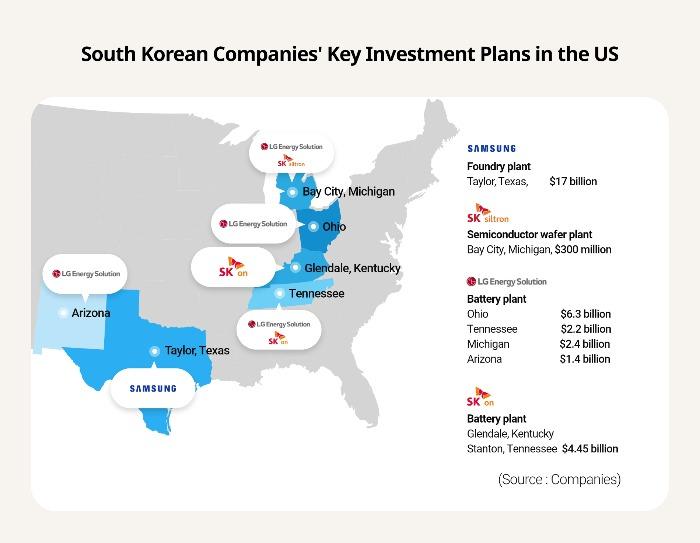South Korea’s major conglomerates are reevaluating their investment strategies in the United States amidst changing economic and geopolitical landscapes. With rising costs, shifting trade policies, and increasing regulatory scrutiny, leading firms are adopting a more cautious approach toward their U.S. expansion plans. This shift signals a potential recalibration in the global investment patterns of Korean businesses, with significant implications for bilateral economic relations and the broader international market.
Korean Conglomerates Assess Impact of U.S. Regulatory Challenges on Investment Strategies
South Korea’s largest conglomerates are recalibrating their U.S. investment strategies amid growing regulatory scrutiny from American authorities. Concerns over stricter compliance requirements and rising geopolitical tensions have prompted companies to reconsider the scale and timing of future ventures. Key players in sectors ranging from technology to automotive are prioritizing risk assessment and are actively engaging with legal experts to navigate the evolving regulatory landscape effectively.
Industry insiders highlight several critical factors influencing these strategic shifts:
- Increased compliance costs: Complex reporting obligations and potential penalties are driving higher operational expenses.
- Market entry delays: Extended approval processes are causing postponements in project launches.
- Supply chain uncertainties: Regulatory impacts on cross-border logistics create volatility concerns.
These challenges are leading conglomerates to diversify their investment portfolios by exploring alternative regions and focusing more on domestic innovation. As they adapt to the heightened regulatory environment, South Korean firms aim to balance growth aspirations with diligent risk management.
| Conglomerate | Key Concern | Strategic Response |
|---|---|---|
| Samsung | Compliance complexity | Enhanced legal frameworks |
| Hyundai | Supply chain risk | Localized production |
| LG | Market entry delays | Focus on Asia-Pacific |
Shifts in Supply Chain Priorities Influence Investment Reevaluation Among Leading Korean Firms
Recent shifts in global economic conditions and geopolitical tensions have compelled major Korean conglomerates to reassess their strategic investment portfolios, particularly in the United States. Concerns about supply chain reliability, rising costs, and evolving regulatory landscapes have prompted companies to prioritize flexibility and regional diversification over previous expansion plans. This recalibration signals a notable pivot in corporate strategies, emphasizing resilience and adaptability in the face of uncertainty.
Key factors influencing this shift include:
- Increasing complexity in U.S.-China trade relations
- Escalating logistics and transportation expenses
- Heightened focus on domestic supply chain security
- Emerging opportunities in Southeast Asia and other regional markets
| Company | Previous U.S. Plan | New Strategic Focus |
|---|---|---|
| Samsung | Expansion of semiconductor fabs | Investment in Southeast Asian manufacturing hubs |
| Hyundai | Establishment of new U.S. EV plants | Strengthening supply chain in Korea and Asia |
| LG | Consumer electronics R&D centers | Digital transformation and local partnerships |
Strategic Responses to Geopolitical Tensions Shape Future U.S. Market Engagement Plans
In response to escalating geopolitical uncertainties, leading Korean conglomerates are recalibrating their strategies concerning U.S. investments. The shifting landscape, marked by trade disputes and evolving regulatory frameworks, has prompted key decision-makers to adopt a more cautious and calculated approach. Emphasis is now placed on risk mitigation and strategic agility, with companies opting to diversify their investment portfolios across multiple regions instead of committing heavily to U.S.-centric projects. This adjustment reflects a nuanced understanding that enduring tensions could directly impact long-term profitability and operational stability.
Key factors influencing the strategic pivot include:
- Heightened regulatory scrutiny and compliance costs
- Supply chain vulnerabilities exposed by geopolitical disruptions
- Emerging market opportunities offering favorable growth prospects
- Government policies encouraging balanced foreign investment
| Conglomerate | Previous U.S. Investment Focus | Revised Strategy |
|---|---|---|
| Samsung | Semiconductor manufacturing expansion | Increased R&D in Southeast Asia |
| Hyundai | Automotive production plants | Strategic partnerships in Europe |
| LG | Consumer electronics distribution | Diversified into emerging Asian markets |
Recommendations for Navigating Policy Uncertainty and Enhancing Cross-Border Collaboration
To mitigate the risks posed by fluctuating regulatory landscapes, Korean conglomerates should prioritize agile risk management frameworks that incorporate real-time policy monitoring. Establishing dedicated cross-functional teams to interpret evolving U.S. trade and investment regulations can enhance responsiveness and strategic decision-making. Furthermore, fostering transparent communication channels with U.S. policymakers and industry stakeholders will enable businesses to anticipate changes and adapt investment plans proactively.
Key strategies for bolstering cross-border collaboration include:
- Forming bilateral advisory councils that bring together Korean and U.S. business leaders and government officials.
- Investing in joint research and development projects to build long-term partnerships resistant to policy shocks.
- Expanding cultural competence programs to facilitate smoother negotiations and operational integration across borders.
| Recommended Approach | Expected Benefit |
|---|---|
| Real-time Policy Analytics | Enhanced foresight and agility |
| Bilateral Advisory Councils | Improved stakeholder alignment |
| Joint R&D Investments | Strengthened innovation pipelines |
| Cultural Competence Programs | Seamless cross-cultural negotiations |
In Summary
As Korean conglomerates reevaluate their investment strategies amid evolving geopolitical and economic landscapes, their cautious stance toward U.S. ventures underscores broader uncertainties facing global business operations. Monitoring these developments will be crucial for stakeholders aiming to navigate the shifting dynamics between major economies in the months ahead.




